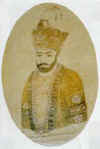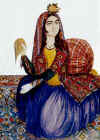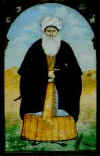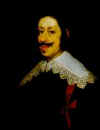The Azerbaijan State Museum of Art
 The Azerbaijan State Museum of Art is a storehouse of the works of art beginning from the
ancient period up to the present time. All kinds of art are completely represented here.
The art of Azerbaijan, West-Europe, Russia, the East is displayed in the halls of our
museum.
The Azerbaijan State Museum of Art is a storehouse of the works of art beginning from the
ancient period up to the present time. All kinds of art are completely represented here.
The art of Azerbaijan, West-Europe, Russia, the East is displayed in the halls of our
museum.The museum was founded in 1920 and at present it is situated in two old buildings, which were built at the end of the XIX centure.
The exposition of our museum is constructed in historico-chronological succession and by countries.
The collection of the art of West-Europe: Italy, Flandry, Holland, Germany and France is remarkable in so far as includes works by all the betterknown painters of the XVI-XIX cc. Bassano L., Solimena F., Brouwer A., Claesz P., Sustermans J., Kaulbach F.A., Dupre J., Dagnan-Bouveret and etc.
 In the section of Russian art there are the works of such outstanding artists of the
XVIII-XIX cc. as Borovikovsky V.L., Argunov N.I., Lampi The Elder, Tropinin V.A., Shishkin
I.I., Vereshchagin P.P., Aivazovsky I.K., Korovin K.A., Serov V.A., Roerich N.K.
In the section of Russian art there are the works of such outstanding artists of the
XVIII-XIX cc. as Borovikovsky V.L., Argunov N.I., Lampi The Elder, Tropinin V.A., Shishkin
I.I., Vereshchagin P.P., Aivazovsky I.K., Korovin K.A., Serov V.A., Roerich N.K.
The collection of Azerbaijan art covers a vast span of time. The earliest exhibits:
archaeological vessels date from the 6-4 millenia B.C., which were discoved on the
territory of the different regions of Azerbaijan such as Khanlar, Mingechaur and others,
ceramics of the Middle Ages, bronze and copper wares of the XI-XIX cc., unique ancient
carpet and carpet wares of Guba, Baku, Shirvan, Tabriz, Garabakh, Kazakh centres of
carpet-making: jewelry, executing in the different techniques such as filigree, chazing,
ware-drawing, granulation, enamel work. The chief centres of jewellery-making art in
Azerbaijan were located in Baku, Gyanja, Shamakhy, Shusha, Sheki, Tabriz.
 But Azerbaijan carpet-making art, miniature paintings, book art represent one of the most
interesting pages in the centure-old history ofEasten peoples and occupy by right their
honourable place among the treasures of world artistic culture.Azerbaijan miniature has
covered a long and complex way of development and reached its flowering in the XVI
centure. Tabriz school of miniature played the leading role in the development of
miniature paintings not only in such Azerbaijan towns as Tabriz. Baku, Shamakhy, but in
Iran, Turkey, the Middle Asia, Afganistan and Mogol school of miniature painting in India.
But Azerbaijan carpet-making art, miniature paintings, book art represent one of the most
interesting pages in the centure-old history ofEasten peoples and occupy by right their
honourable place among the treasures of world artistic culture.Azerbaijan miniature has
covered a long and complex way of development and reached its flowering in the XVI
centure. Tabriz school of miniature played the leading role in the development of
miniature paintings not only in such Azerbaijan towns as Tabriz. Baku, Shamakhy, but in
Iran, Turkey, the Middle Asia, Afganistan and Mogol school of miniature painting in India.
Azerbaijan easel and book miniatures of the XVII-??? cc., varnished miniatures of the
XVIII-XIX cc. are demonstrated in the halls of our museum.
 XIX c. was a period of the growth of the realistic tendencies in fine art of Azerbaijan. In
paintings and drawing of that period organically combine realistic features and
miniature's influence. These new tendencies reflected especially bright in the creation of
such artists of the XIX c. as Mirza Kagym, Mir Movsum Navvab, Abbas Husseyni. These
peculiarities were developed later in the creation of the artists of the early XXth ?.
Kengherii ?., Azimzade A.Splendid pile and pileless, thematical and ornamental carpets and
carpet wares are indispensable part of our Azerbaijan section, because carpet-making is
one of the most ancient and the most widely spread kind of Azerbaijan decorative and
applied art.
XIX c. was a period of the growth of the realistic tendencies in fine art of Azerbaijan. In
paintings and drawing of that period organically combine realistic features and
miniature's influence. These new tendencies reflected especially bright in the creation of
such artists of the XIX c. as Mirza Kagym, Mir Movsum Navvab, Abbas Husseyni. These
peculiarities were developed later in the creation of the artists of the early XXth ?.
Kengherii ?., Azimzade A.Splendid pile and pileless, thematical and ornamental carpets and
carpet wares are indispensable part of our Azerbaijan section, because carpet-making is
one of the most ancient and the most widely spread kind of Azerbaijan decorative and
applied art.
The specimens of fine Azerbaijan carpets and carpet wares are in the collections of the
word's largest museums - the Hermitage in Sankt-Peterburg, the Victoria and Albert in
London, the Textile in Washington, the Louvre in Paris, the Topkapi in Istanbul and
others.
 As the written sources say, carpet-making art was already high developed in Azerbaijan in the
Middle Age and that's why carpet were exported to the different countries of the world in
the XV c.
As the written sources say, carpet-making art was already high developed in Azerbaijan in the
Middle Age and that's why carpet were exported to the different countries of the world in
the XV c.
Many famous painters of the world used in their works an Azerbaijan carpet as a decorative
element. In this way a Dutch painter Gans Memling (1433-1494) used in his picture
"Maria with a baby" Mugan carpet, Shirvan group of carpets, Azerbaijan. The
image of the Gyanja-Kazakg carpet may be seen in the picture of the famous German painter
of Renaissance G.Golbein "Ambassadors".
From technological point of view all carpets are derived into pile and pileless. Pileless
carpets (Palas, Jedjim, Kilim, Shedde, Verni, Zili and Sumakh) are much older than pile
carpets and are noted for their original designs and bright colours.
Pile carpets are especially valuable. Pile carpets may be thematical ("The
Seasons", "Dervish", "Ovchulug", and so on.) and ornamental
("Alichanly", "Piryabedil", "Surakhany",
"Golluchichi", "Gymyl", "Shamachy" and others). The names of
the carpets are mainly associated with the places they come from.
 The best specimens of decorative and applied art of Azerbaijan are famous far beyond the
borders of the country and by right are a part of golden fund of world culture.
The best specimens of decorative and applied art of Azerbaijan are famous far beyond the
borders of the country and by right are a part of golden fund of world culture.
The section of modern art of Azerbaijan consisting of painting, drawing, sculpture, the
items of decorative and applied art aquants with creation of our outstanding artists and
young talanted masters, whose works are famous far beyond the borders of Azerbaijan.
 Rich collection of the Azerbaijan State Museum of art help to see the unknown sides of the
monuments of the past and to discover some peculiarities of modern art.
Rich collection of the Azerbaijan State Museum of art help to see the unknown sides of the
monuments of the past and to discover some peculiarities of modern art.
Of course, no one reproduction could change originals. Each of them help you to revive
impressions, getting in the museum and, of course, we'll be very glad to see you in our
temple of art those, who haven't an opportunity yet to visit our museum.
Address: 31, Istiglaliyat st., Baku 370001, Azerbaijan Republic
Tel. (994 12) 923 931

